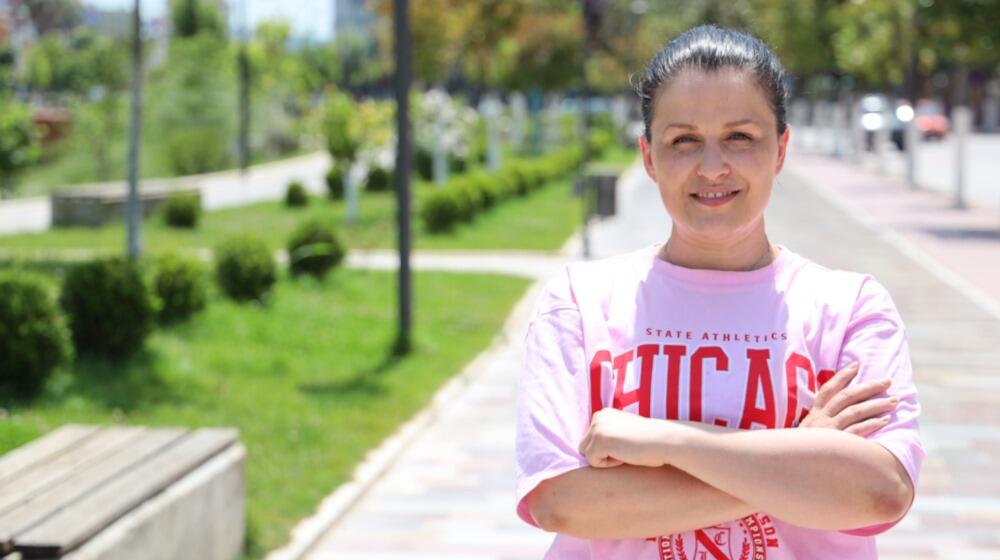In 2019, the Government of Albania, with UNFPA support, established the country’s first cervical cancer screening programme targeting women between 40 and 50 years old.
So far, 52,000 women have been screened. Albania aims to screen 80 per cent of this target group by the end of 2025.
“My illness was discovered by chance.”
In October 2022, Albana Çapo, 38 years old, from Fier, in southern Albania, accompanied her mother-in-law to hospital for a checkup after treatment for cervical cancer when the doctor suggested he give Ms. Çapo a checkup too.
“The doctor found a small lump,” she said. “I thought it was a routine infection and carried on with my day.”
A few hours later, after testing the lump, the doctor phoned Ms. Çapo.
“I was diagnosed with cervical cancer,” she said. “I couldn't believe it. I had no symptoms, no signs or indications, no weakness, no bleeding. Nothing. To say that I wasn't afraid would be a lie. I was very scared, I cried.”
This was the first time Ms. Çapo had been screened for cervical cancer. The following month, she had surgery to remove the cancer.
Cervical cancer is the second most common cause of cancer death among reproductive-age women in Eastern Europe and Central Asia. It primarily affects younger women, with the majority of cases occurring between 35 and 45 years of age. Every year, there are more than 38,000 new cases and 18,000 deaths from cervical cancer in the region.
In Albania, incidence and mortality rates are relatively low compared to that of other countries in the region: according to official data, the average mortality rate of cervical cancer between 2013 and 2017 was 2.9/100,000, and it was 3.3/100,000 in 2020, the last year for which data is available.
Although rates are relatively low, a considerable number of women die needlessly. In part, this is due to a lack of capacity within the health service and a lack of systematic screening. Screening programmes can reduce cervical cancer rates by up to 80 per cent or by up to 90 per cent if combined with the human papillomavirus (HPV) vaccination of adolescent girls.
When Ms. Çapo was declared free of cancer, she encouraged everyone she knew to get screened.
“I told my friends, relatives and colleagues to get tested to help prevent them from going through what I went through.”
The Ministry of Health and Social Protection and Institute of Public Health estimates that between 2,000 and 3,000 healthy years are lost to cervical cancer every year in Albania costing the country US$6 million annually in lost productivity and cost to the health care system.
To rectify the situation, in early 2019, the Government of Albania, with financial and technical support from UNFPA, established the country’s first cervical cancer screening programme targeting women between 40 and 50 years old. More than 500 health professionals from around 400 health centres across Albania were trained to screen women. Both the screening tests, and follow-up examinations, are provided free of charge, regardless of the health insurance status of the patient. So far, more than 45,000 women have been screened, and Albania aims to screen 80 per cent of the target age group by the end of 2024.
In tandem with the screening programme, Albania launched a UNFPA-supported campaign in 2020 to vaccinate girls against HPV, the sexually transmitted virus that causes most cases of cervical cancer. In line with WHO recommendations, the campaign’s primary target is girls aged 10 to 14, before the start of sexual activity.
Ms. Çapo made sure her daughter was one of the first in line for the vaccine.
“One month after I was operated on, the HPV vaccination campaign started,” said Ms. Çapo. “The doctor suggested my daughter get vaccinated. I can remember telling her that the vaccine would protect her from suffering the way I did."


